| Listing 1 - 10 of 12 | << page >> |
Sort by
|
Book
ISBN: 1685710697 1685710689 Year: 2022 Publisher: Brooklyn, NY punctum books
Abstract | Keywords | Export | Availability | Bookmark
 Loading...
Loading...Choose an application
- Reference Manager
- EndNote
- RefWorks (Direct export to RefWorks)
This book of poems about fake news written by diverse project participants is foremost an invitation and invocation for readers to participate, with others, in an experiment in knowing and working differently with the internet: Fake News Poetry Workshops. Between 2018 and 2020, Alexandra Juhasz directed more than twenty of these workshops around the world, and these are ongoing beyond the confines of this book. Each differs in form and structure, but participants are always asked to attend to research, their own knowledge about the internet and social media, and what they can learn from their workshop and previous ones.My Phone Lies to Me shares the poems created in the workshops. As moving, eloquent, and useful as they may be — and you are invited to indulge in and learn from them — enjoying and learning from the poems is only a small part of this book’s project. Four short essays (two by Juhasz, with a foreword and afterword by critical internet scholars Tara McPherson and Margaret Rhee, respectively) introduce and situate the project’s processes of radical digital media. You can learn what Fake News Poetry Workshops make, do, and believe in, as well as how to collaborate with others to create your own.Fake News Poetry Workshops are one way to counter dominant and dominating internet modes and values, to fight the corrupt ways of being and knowing that use digital media to create, fuel, and weaponize fake news. The project verifies good news in the face of fake news: that we can gather together in our many local places and use analog structures (about digital things and ways) to generate, hold, and share ""art answers to phony questions.
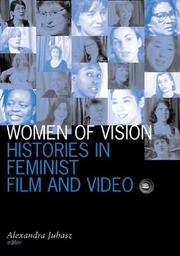
ISBN: 081663372X Year: 2001 Publisher: Minneapolis (Minn.) : University of Minnesota press,
Abstract | Keywords | Export | Availability | Bookmark
 Loading...
Loading...Choose an application
- Reference Manager
- EndNote
- RefWorks (Direct export to RefWorks)
Book
Year: 2001 Publisher: Minneapolis University of Minnesota Press
Abstract | Keywords | Export | Availability | Bookmark
 Loading...
Loading...Choose an application
- Reference Manager
- EndNote
- RefWorks (Direct export to RefWorks)
Mass communications --- Film --- Movies --- Interviews --- Media --- Film directors --- Book --- United States of America
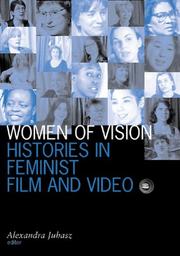
ISBN: 9780816652846 9780816633722 Year: 2001 Publisher: Minneapolis University of Minnesota Press
Abstract | Keywords | Export | Availability | Bookmark
 Loading...
Loading...Choose an application
- Reference Manager
- EndNote
- RefWorks (Direct export to RefWorks)
Alexandra Juhasz asked twenty-one women to tell their stories—women whose names make up a who is (and who will be) who of independent and experimental film and video. What emerged in the resulting conversations is a compelling (and previously underdocumented) history of feminism and feminist film and video, from its origins in the fifties and sixties to its apex in the seventies, to today. Women of Vision is a companion piece to Juhasz’s 1998 documentary of the same name. The book presents the complete interviews, allowing readers to hear directly the voices of these articulate, passionate women in an interactive remembering of feminist media history. Juhasz’s introduction provides a historical, theoretical, and aesthetic context for the interviews. These subjects have all shaped late twentieth-century film and video in fundamental ways, either as artists, producers, distributors, critics, or scholars, and they all believe that media are the most powerful tools for effecting change. Yet they are a very diverse group, with widely varying personal and professional backgrounds. By presenting their interviews together, Juhasz shows the differences among those involved in feminist media, but also the connections among them, and the way in which the field has been enriched by their sharing of knowledge and power. In the end, Juhasz not only records these women’s careers, she broadens our understanding of feminism and shows how feminist history and documentary are made.
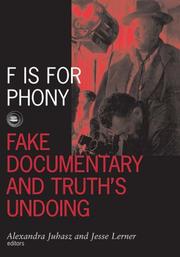
ISBN: 9780816642519 0816642508 9780816642502 0816642516 9780816642519 Year: 2006 Publisher: Minneapolis : University of Minnesota Press,
Abstract | Keywords | Export | Availability | Bookmark
 Loading...
Loading...Choose an application
- Reference Manager
- EndNote
- RefWorks (Direct export to RefWorks)
Fake documentaries mimic documentary genre expectations, unraveling the documentary's authority and dismantling understandings of identity, history, and nation. The interdisciplinary essays in F Is for Phony discuss a broad scope of works and explore issues raised by "fake docs" such as the fiction/documentary divide, the ethics of reality-based manipulation, and whether documentariness derives from form or reception. Defining the borderline between fact and fiction, the contributors reveal what fake documentaries imply and usually make explicit: that many documentaries lie to tell the truth, and that the truth is relative.
Docufictions --- Films documentaires --- Documentary-style films --- Histoire et critique --- History and criticism. --- film --- filmtheorie --- documentaire --- documentaire film --- mockumentary --- 791.41 --- Documentaries, Fake (Motion pictures) --- Documentary films, Fake --- Documentary films, Fictionalized --- Documentary films, Mock --- Fake documentaries (Motion pictures) --- Fake documentary films --- Fictionalized documentary films --- Mock documentary films --- Mockumentaries (Motion pictures) --- Mockumentary films --- Pseudo-documentary films --- Quasi-documentary films --- Semidocumentary films --- Motion pictures --- History and criticism --- Histoire et critique.
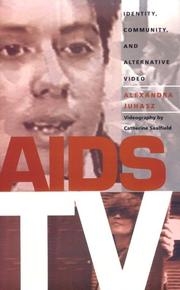
ISBN: 0822316838 0822316951 0822396076 1322112444 Year: 1995 Publisher: Duke University Press
Abstract | Keywords | Export | Availability | Bookmark
 Loading...
Loading...Choose an application
- Reference Manager
- EndNote
- RefWorks (Direct export to RefWorks)
Book
ISBN: 0822370719 0822370867 0822371855 Year: 2018 Publisher: Duke University Press
Abstract | Keywords | Export | Availability | Bookmark
 Loading...
Loading...Choose an application
- Reference Manager
- EndNote
- RefWorks (Direct export to RefWorks)
Book
ISBN: 9780470671641 Year: 2015 Publisher: Chichester ; New York ; Brisbane ; Toronto ; Singapore John Wiley & Sons
Abstract | Keywords | Export | Availability | Bookmark
 Loading...
Loading...Choose an application
- Reference Manager
- EndNote
- RefWorks (Direct export to RefWorks)
Book
ISBN: 147800777X 1478008253 1478009268 Year: 2020 Publisher: Duke University Press
Abstract | Keywords | Export | Availability | Bookmark
 Loading...
Loading...Choose an application
- Reference Manager
- EndNote
- RefWorks (Direct export to RefWorks)
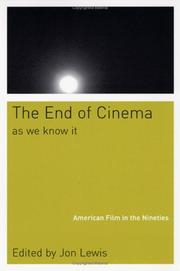

ISBN: 9780814753194 9780814751602 Year: 2001 Publisher: New York, N.Y. New York University Press
Abstract | Keywords | Export | Availability | Bookmark
 Loading...
Loading...Choose an application
- Reference Manager
- EndNote
- RefWorks (Direct export to RefWorks)
| Listing 1 - 10 of 12 | << page >> |
Sort by
|

 Search
Search Feedback
Feedback About UniCat
About UniCat  Help
Help News
News